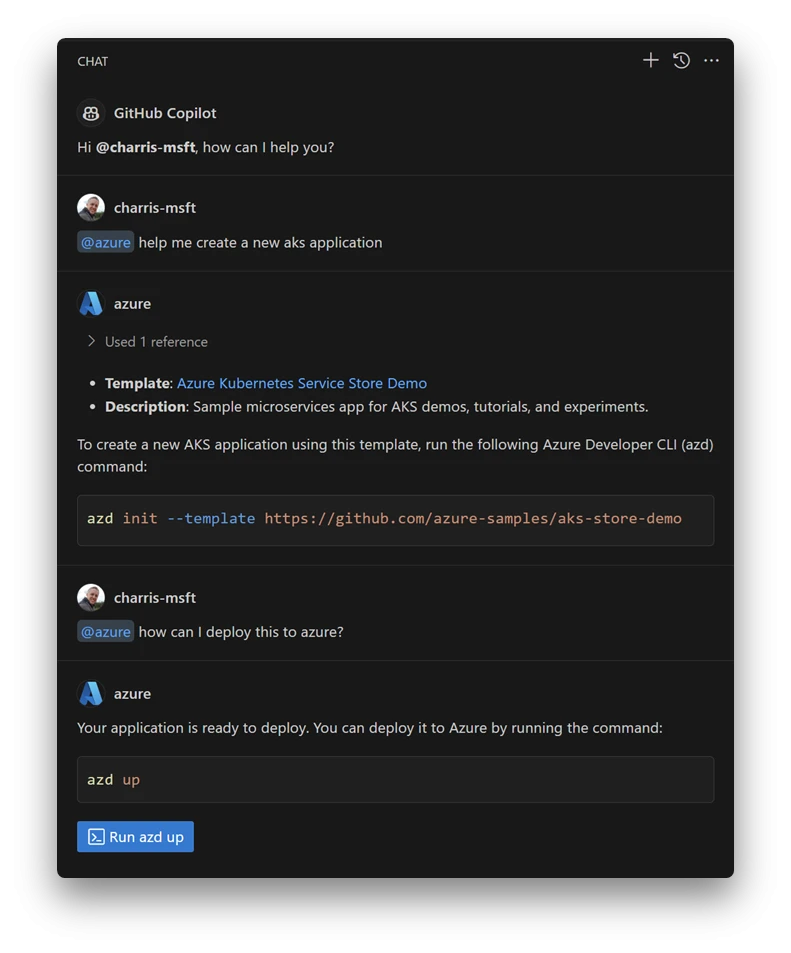At the recent GitHub Universe, Microsoft announced new capabilities and tools that further integrate Microsoft Azure AI services directly into developer tools like GitHub and VS Code.
These innovations stem from the company's mission to create AI-enhanced, end-to-end development environments with robust support from the developer community. With new features in GitHub Copilot for Azure and VS Code, developers can now integrate AI within their existing workflows.
In a LinkedIn post, Spencer Reynolds, a product designer leader at Microsoft, commented on the features:
This is part of the Copilot ecosystem, aiming specifically to enable users the ability to interact with Azure, viewing resources, spinning up additional resources, etc.
Among the announcements, GitHub Copilot for Azure offers developers tailored, context-aware guidance directly within GitHub and VS Code. Using the "@azure" command, developers can now access personalized support for managing resources, deploying applications, and troubleshooting. This feature, which expands upon GitHub Copilot's existing AI chat capabilities, promises to simplify resource provisioning and streamline application deployment through Azure Developer CLI (azd) templates, helping developers focus on core tasks while Copilot handles background processes and cost-management inquiries.

(Source: Azure Developer Tools blog post)
In addition, to cut down development time, Microsoft has introduced AI App Templates for accelerated deployment. These templates enable developers to jumpstart projects with pre-designed frameworks and components across multiple environments, including GitHub Codespaces, VS Code, and Visual Studio. The templates offer flexibility, supporting popular programming languages, models, and frameworks from leading AI tool providers such as Arize, LangChain, and Pinecone. With these tools, developers can easily integrate key security measures, such as Managed Identity and keyless authentication, into their applications, speeding up development while ensuring robust data protection.
Kristen Womack, a principal product manager of Azure Developer CLI, writes in an Azure SDK blog post about AI App Templates:
This collection includes fully working applications complete with app code, AI features, infrastructure as code (IaC), configurable CI/CD pipelines with GitHub Actions, and an application architecture ready to deploy to Azure. It also includes smaller templates that are building blocks hosting just a component you need, like keyless authentication or IaC.
To support AI model experimentation and customization, GitHub Models, now in preview, integrates Azure AI’s extensive model library directly within the GitHub Marketplace. This feature allows developers to compare and experiment with various models for diverse applications, including proprietary and open-source options. Developers can test model performance and functionality in real-time, adjusting and scaling their use from free tiers to enterprise-level production environments with Azure’s secure tokenized infrastructure.
Addressing the often cumbersome process of updating Java runtimes, GitHub Copilot now includes an upgrade assistant specifically for Java. This tool guides developers through each step of runtime upgrades, helping ensure compatibility with frameworks like Spring Boot and JUnit. It leverages AI to resolve potential conflicts, creating an efficient and transparent upgrade experience that minimizes the manual labor typically involved in updating Java applications.
Nick Zhu, a senior program manager at Microsoft, writes in a Microsoft for Java Developers blog post:
In this preview experience, the GitHub Copilot upgrade assistant for Java will analyze your project and work with you to specify things such as parameters like JDK and Maven paths, a feature branch name and more. It will further assess your project for dependencies like Spring Boot and unit test frameworks like JUnit too. You can optionally select to generate a GitHub issue, where a record of the tasks in the proposal and plan will be copied.
Finally, Microsoft has also expanded its capabilities for A/B testing and CI/CD workflows, enabling organizations to evaluate AI applications at scale. With the Azure AI Evaluation SDK and GitHub Actions integration, developers can run continuous performance evaluations and A/B experiments, ensuring that AI models perform optimally in real-world environments. The integration supports coherence and fluency metrics and can provide custom insights for improved decision-making, making it easier for developers to manage and enhance application performance.